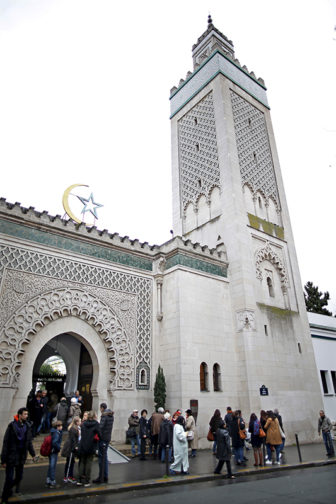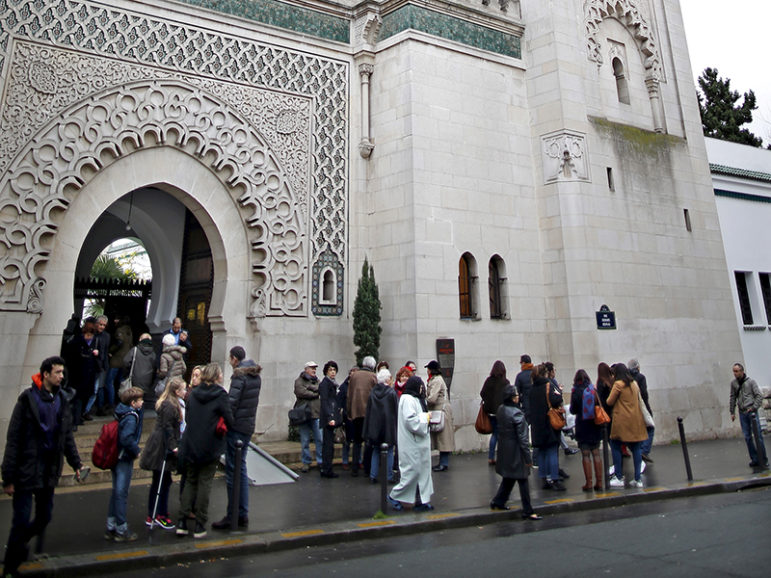
Visitors leave the Paris Grand Mosque during an open-day weekend for mosques in France, on Jan. 10, 2016. Photo courtesy of REUTERS/Charles Platiau
PARIS (RNS) Violent Islamist attacks in France and Germany have piled pressure on the two governments to search for new ways to confront the grim challenge they now face: radicalized Muslim youth.
The murder of a French Catholic priest last month, coming after three massacres that claimed a total of 232 lives in the past year and a half, has provoked calls for tough measures such as the internment of thousands of suspected radical Muslims — measures critics warn would be unconstitutional.
Germany, until recently spared the worst of these attacks, has had several “lone wolf” attacks this year that have claimed a total of 10 dead and left police baffled because the assaults seemed unpredictable. Germany also has to contend with a rising tide of nationalism among its Turkish minority after the failed coup against Islamist-leaning Turkish President Recep Tayyip Erdogan.
In both countries, politicians are concerned that the failure to integrate some young Muslims into mainstream society has created a resentment that radical Islamist recruiters can exploit.
But solving that is a long-term project and pressure for leaders to take action now is strong.
Since security in both countries has already been ratcheted up, attention has turned toward the large established mosque associations that claim to speak for their Muslim communities.
National mosque associations represented in the French Council of the Muslim Faith or DITIB, the mosque network for ethnic Turkish Muslims in Germany, have come under increasing criticism for failing to play their part in integrating Muslim youths.
Paris has begun discussing several measures to overhaul its relations with the country’s Muslim minority, Europe’s largest at 5 million. Muslim leaders are open to more cooperation with the government, but some prominent personalities have warned there are limits to what the religious community can do.
“Reforming Islam is good idea, but it’s an illusion to think that this will eradicate radicalization of young people,” Tareq Oubrou, the Bordeaux imam who is one of the leading Muslim personalities in France, said after hearing the government’s proposals.
“It’s not enough to build a mosque with local financing to make it moderate, nor that an imam is trained in France,” he said. “Many foreign imams are much more moderate than some French imams of the second generation who have been trained in France.”
Prime Minister Manuel Valls announced a tougher stand, both against the Islamic State group in the Middle East as well as against radicalism at home.
“We will win, because France has a winning strategy for fighting against Islamic totalitarianism, the world’s enemy No. 1, which we are fighting in Syria and Iraq and also in France,” he said.
One of his ideas is a temporary ban on all donations from abroad to French mosques, which are generally believed to be a factor fueling the spread of radical Islam in France.
Instead, he said, France would resurrect a plan for a state-sponsored foundation to centralize domestic and foreign donations and distribute them in a transparent way to finance mosques.
A decade ago and amid much fanfare, an earlier conservative government launched the Foundation for Islamic Charities to do just that. But it never worked because the main established Muslim organizations, all of which receive money from abroad, squabbled endlessly over how to run it.
This time around, the foundation will be expanded to go beyond the discredited mosque associations to involve prominent French Muslims from other walks of life.
A group of 41 such Muslims — politicians, professors, doctors, lawyers and entrepreneurs — published an appeal last week accusing the French Council of the Muslim Faith of failing to represent the country’s Muslims and saying they were ready to join in the new approach Valls announced.
While the idea has popular support, a recent inquiry by a French Senate commission concluded these funds had little to do with terrorism.
“These proposals assume that radicalization comes from mosques, which is not true,” said Sen. Nathalie Goulet, a co-author of the commission report. Radical Islamists are usually inspired online or by personal contacts, she said.
Also, the bulk of foreign donations flow not from Saudi Arabia or the Persian Gulf to radical mosques in France, but from Algeria, Morocco and Turkey to mainstream mosques, she stressed.
Valls and Interior Minister Bernard Cazeneuve have also hinted they might favor a concordat with the Muslims, a contract that would allow state funding in exchange for official influence over the Islamic community.
Among other things, this would help train imams in France so they reflect the country’s democratic values rather than radical ideas from abroad. “France should become a center of excellence for teaching Muslim theology in Europe,” he said.
After a few days of debate, President Francois Hollande stepped in to quash the idea. “The financing cannot come from the state,” he said, reminding them that France’s system of church-state separation banned that.
Valls has rejected some proposals from conservative opposition politicians, such as the call for detention camps, as too extreme. “My government will not be the one that creates a Guantanamo a la francaise,” he said.
German Chancellor Angela Merkel, who is famous for her cautious leadership, has reacted with less drama to the attacks.
But pressure is mounting there because of last year’s rapid influx of refugees from the Muslim world, which has challenged state and local authorities to integrate them better than Germany did the Turkish minority that began coming in the 1960s.
Because they originally came as “guest workers,” Germany long failed to focus on integrating its Turks. Many among the 3 million-strong minority now fit in well, but some still seem to be much more Turkish than German.
This has led to concern about badly integrated “parallel communities” that could be breeding alienated youths who could turn radical.
Critics have increasingly linked this integration problem with the country’s established Muslim organizations, especially DITIB, the German branch of Turkey’s religious affairs department in Ankara, which sends Turkish imams to work in the over 900 Islamic centers around the country.
The toughest accusations are coming from German Muslims who accuse DITIB of advocating a conservative Islam not adapted to life in Germany. They also question its independence at a time when Erdogan’s rule is becoming increasingly autocratic.
“DITIB says it is a German association, but it takes its orders from Ankara,” said German Commissioner for Immigration, Refugees and Integration Aydan Ozoguz, an ethnic Turkish politician.
Bassam Tibi, a Syrian-born political scientist, called DITIB a “stooge” of Erdogan’s Islamist-rooted AKP. “They have no interest in an Islam suited to Europe.”
Lale Akgün, a former German Parliament deputy born in Turkey, accused DITIB of mobilizing German Turks to attend rallies in support of Erdogan after the failed coup. DITIB itself rejects suggestions that it is Ankara’s puppet.
After three attacks in July, Merkel held a long-awaited news conference to give her reaction.
“Fear cannot be our guide for political action,” she declared while sketching out a careful nine-point program for more security. Among them was an “early warning system” to flush out radicals among the refugees, closer surveillance of social media and the use of army troops to help police deal with terror incidents.
Colleagues from her Christian Democratic Union party have also urged DITIB to show more loyalty to Germany and not act as Ankara’s agents.
But Merkel, who needs Turkey’s help to block Middle Eastern refugees from streaming toward Germany as they did last year, passed over those calls in silence, avoiding opening up a dispute with Erdogan.
(Tom Heneghan is a Paris-based correspondent)





